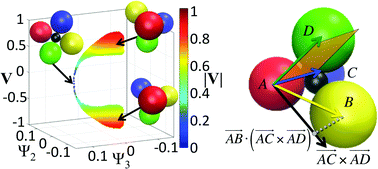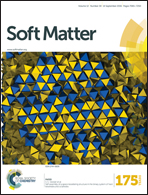Nonlinear machine learning and design of reconfigurable digital colloids†
Abstract
Digital colloids, a cluster of freely rotating “halo” particles tethered to the surface of a central particle, were recently proposed as ultra-high density memory elements for information storage. Rational design of these digital colloids for memory storage applications requires a quantitative understanding of the thermodynamic and kinetic stability of the configurational states within which information is stored. We apply nonlinear machine learning to Brownian dynamics simulations of these digital colloids to extract the low-dimensional intrinsic manifold governing digital colloid morphology, thermodynamics, and kinetics. By modulating the relative size ratio between halo particles and central particles, we investigate the size-dependent configurational stability and transition kinetics for the 2-state tetrahedral (N = 4) and 30-state octahedral (N = 6) digital colloids. We demonstrate the use of this framework to guide the rational design of a memory storage element to hold a block of text that trades off the competing design criteria of memory addressability and volatility.



 Please wait while we load your content...
Please wait while we load your content...